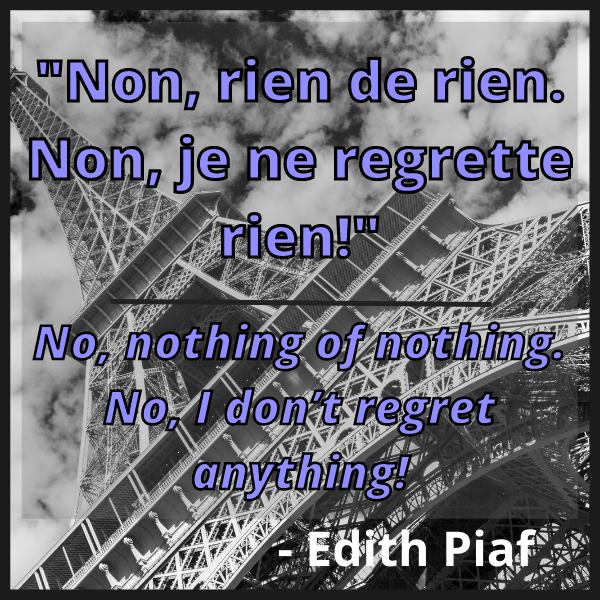Song Overview
Edith Piaf’s “Non, Je Ne regrette Rien” is her second most famous song. The meaning of “Non, Je Ne Regrette Rien is “No, I don’t regret anything” or “No, I don’t have any regrets”. The song was written by composed by Charles Dumont and Michel Vaucaire in 1956 but wasn’t recorded by Piaf until 1960. The song is seen as her last great work as she passed away three years later.

Towards the bottom of this post we’ve included both the complete French and English song lyrics as well as ways to listen to the song on YouTube and Spotify.
The song’s lyrics convey a strong message of optimism. Piaf sings that she does not have any regrets and has let go of all things that happened to her – both good and bad.
The message is very positive: She expresses that she’s starting new today from zero and that her life and joys start with you!
After learning the lyrics to song, you can discover the following famous French songs: La Vie en Rose (Edith Piaf), C’est Si Bon (Yves Montant), Les Champs Élysées (Joe Dassin) and Ne Me Quitte Pas (Jacques Brel).

Grammatical analysis
Je ne regrette rien
The word ‘rien‘ means nothing or anything. The French usually use ‘ne…pas’ in for negation. For example, ‘je ne mange pas’ means ‘I am not eating’.
However, when rien replaces pas, the meaning changes. ‘Je ne mange rien’ means ‘I don’t eat anything’. Hence, in the lyrics, ‘Je ne regrette rien’ means both ‘I don’t regret anything’ and ‘I’m not sorry about anything’.
Je me fous du passé
Je me fous du passé translates to ‘I don’t care about the past’. The verb ‘foutre’ is slang and can replace faire (to make, do).
‘Qu’est-ce que tu fous?’ is slang for ‘What are you doing’. In the reflexive form, ‘se foutre de + noun’ means to not care about.
For example, ‘Je me fous de cette situation’ would translate to ‘I don’t care about this situation.
Tout ça m’est bien égal
The translation of ‘tout ça m’est bien égal’ is all or everything is okay for me. The expression ‘ ça m’est bien égal ‘ translates to ‘I don’t mind’, ‘It doesn’t matter’ and ‘It’s all the same to me’. By adding the word ‘tout’, Piaf is expressing that everything is fine with her.
Je n’ai plus besoin d’eux!
The phrase, ‘Je n’ai plus besoin d’eux!’ is a bit complicated. Piaf is combing the phrase ‘avoir besoin de‘, which means to need with a special negation.
The special negation is ne…plus, which means anymore. For example, ‘je ne mange plus’ means ‘I don’t eat anymore’ or ‘I’m no longer eating’. Hence, Je n’ai plus besoin d’eux translates to ‘I no longer need them’.
Non, Je ne Regrette Rien Lyrics and translation
Non, rien de rien
Non, je ne regrette rien
Ni le bien qu’on m’a fait
Ni le mal; tout ça m’est bien égal!
No, nothing of nothing
No, I don’t regret anything
Neither the good things people have done to me
Nor the bad things, it’s all the same to me.
Non, rien de rien
Non, je ne regrette rien
C’est payé, balayé, oublié
Je me fous du passé!
No, nothing of nothing
No! I don’t regret anything
It’s paid for, swept away, forgotten,
I don’t care about the past!
Avec mes souvenirs
J’ai allumé le feu
Mes chagrins, mes plaisirs
Je n’ai plus besoin d’eux!
With my memories
I lit up the fire
My troubles, my pleasures
I don’t need them anymore!
Balayés les amours
Et tous leurs trémolos
Balayés pour toujours
Je repars à zéro
The lovers are all swept away
And all of their drama
Swept away forever
I start again from zero
Non, rien de rien
Non, je ne regrette rien
Ni le bien qu’on m’a fait
Ni le mal; tout ça m’est bien égal!
No, nothing of nothing
No, I don’t regret anything
Neither the good things people have done to me
Nor the bad things, it’s all the same to me.
Non, rien de rien
Non, je ne regrette rien
Car ma vie, car mes joies
Aujourd’hui, ça commence avec toi!
No, nothing of nothing
No, I don’t regret anything
Because my life, because my joys
Today that starts with you!
Listen to Non, Je Ne Regrette Rien on YouTube & Spotify
YouTube
The following is a YouTube video of Non, Je Ne Regrette Rien. Listen and follow along with the French and English lyrics above!
Spotify
You can also listen here if you have an account on Spotify:
More French lessons by David Issokson
Discover more:
- Edith Piaf Songs
- Edith Piaf – La Vie en Rose
- Édith Piaf – Mon Dieu
- Milord – Edith Piaf
- Édith Piaf – Sous Le Ciel De Paris
- C’est Si Bon
- Ne Me Quitte Pas
- Top French songs of all time
- La Marseillaise
- Top 12 Songs for Learning French
